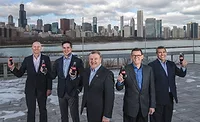2010 Beverage Bottler of the Year: Coca-Cola Bottling Co. Consolidated
Beverage Industry’s 2010 Bottler of the Year is a company whose ownership isn’t afraid to take risks and innovate in order to find new ways to develop revenue streams. Coca-Cola Bottling Co. Consolidated, Charlotte, N.C., has built its core business this year through innovative pricing strategies, enabling its sales force with new technology, grass roots marketing and strengthening its distribution through an automated warehouse picking system.
In addition, Consolidated continues to expand its core competencies in its fourth and newest subsidiary, Red Classic Brokerage — built from maximizing freight back hauling. Consolidated’s Data Ventures, Swift Water Logistics and BYB Brands subsidiaries continue to expand their reach and products and benefit their parent company too.
“It’s an unusual time in this business because of all the difficulty with the economy and all the challenges that we’re facing, and I would just say that’s been a great motivator for us to change,” says Frank Harrison, Consolidated’s chairman of the board of directors and chief executive officer. “We have always been somewhat innovative and always looking for ways to improve our business, but with the pressures of the last few years, I think we’ve realized that we’ve got to change.”
The complexity of the business, whether it be the economy, retailer consolidation, SKU explosion, commodity costs or consumer fatigue in the sparkling category, has pushed Consolidated out of its comfort zone, says Bill Elmore, Consolidated’s president and chief operating officer.
“It’s forced us to consider and pursue all kinds of different things in terms of adjacent businesses, but also how we are operating within our core business,” he says.
Consolidated also developed with The Coca-Cola Co. a new marketing strategy to engage consumers with its brands through issues consumers care about. The company has returned to talking to consumers the way they used to in the beverage industry, says Lauren Steele, the bottler’s vice president of corporate affairs.
“This business was really built by local entrepreneurs, who were very much involved in the community that they served,” he explains. “It was a local business, and there was an intimate relationship with consumers. Whether because of consolidation in the industry or the way the brand owners took over marketing from local bottlers, the soft drink industry really lost touch with its consumers in many ways. Out of necessity, bottlers were focused on efficiency and delivery. In that, we really lost a lot of that connection with our consumers.
“These are very emotional brands. There is an emotional connection between people and Coca-Cola. We wanted to get back to talking with our consumers, engaging them on matters that are important to them, and also giving them a reason to fall in love with our products again.”
This year, Consolidated’s core business has benefitted from its sparkling beverage portfolio. Its growth has been from its primary brands — Coca-Cola Classic, Diet Coke, Sprite and Dr Pepper.
“If you look at the overall health of our business, it’s fascinating for us that our sparkling beverages are holding up right now better than anything else in our portfolio,” Elmore says. “It’s the most profitable piece of our business. It’s our wheelhouse and that’s a real positive.”
This year, Consolidated also took a new approach with its brands in the convenience channel that parallels with the original nickel Coke concept, Elmore says. The bottler took out its 20-ounce bottles, and put its brands in a combination of 16-ounce and 24-ounce bottles. The 16-ounce bottle is priced at $0.99 and the 24-ounce bottle generally sells for around $1.49.
“We’ve seen tremendous uptick in our transactions, in a part of our business for the last couple of years that has been very slow,” Elmore says. “We’re very encouraged by it, particularly because the majority of the consumers in this channel are primarily teenagers and blue collar males, and we are aggressively recruiting them.”
Consolidated has been very focused on how it communicates its new size and price, and $0.99 is not labeled on the package. Instead, the bottler communicates through point-of-sale in the parking lot, at gas pumps, on the front door, by the cash register and where food and beverages are sold.
The Coca-Cola Co.’s expansion of its still beverage portfolio, such as the acquisitions of Glaceau’s Vitaminwater products and Fuze’s lines, and its distribution partnership with Monster has increased the diversity of the bottler’s offerings. Growth in still beverages has slowed, though, in part due to the value Consolidated brought back to sparkling, Elmore says.
“About the same time we lowered the price on sparkling, we also raised the price on enhanced water,” he explains. “If you walk into stores, Coke became $0.99 and Vitaminwater became $1.69, so if you are watching your pennies, what are you going to do?”
Vitaminwater Zero, the new no-calorie version of Vitaminwater sweetened with Truvia, will help to bring new life to the still category this year for the bottler, he says.
In 2010, Consolidated also expects packaging innovations to generate greater margins and revenue. The bottler recently introduced the new signature Coca-Cola contour bottle in a 2-liter size. This year, the company also will roll out a sleek 7.5-ounce mini can with 90 calories per can. In addition to regular Coca-Cola, the packaging will include Sprite, Fanta Orange, Cherry Coca-Cola and Barq’s Root Beer. In its large format stores, Consolidated is testing different pack sizes, and is in the early stage of evaluating additional large bottle configurations for a value pack.
Two years ago, Consolidated also improved the execution of its sales force through a reorganization. The company split the team into a dual organization with one division specializing in distribution and the other one focused on driving sales.
“Now there is a real requirement for coordination and collaboration, and we have clearly defined lines,” Elmore says. “You are either focused on efficiency in distribution or you are focused on sales.”
With the organizational structure change, Consolidated had to address a communication gap between delivery and sales, which often is a home-based operation. This move reduced the sales team’s communication with delivery personnel on customers, orders, delivery instructions and display activity. The company also had to enable its sales force with capable technology and processes to handle more SKUs, new product information, marketing materials and in-store execution.
To bridge the communication gap and to help drive business value, last year Consolidated embarked on a multi-year strategic initiative called Field Force Automation. The goal of the initiative is to provide its workforce with the capability to perform their job duties in a mobile environment as well as the ability to collaborate and address the needs of customers in a timely manner. The company rolled out new mobile devices, including tablet PCs and handhelds, which feature its first internally developed, custom-built solution based on Microsoft technology, for its sales account managers. Orders are taken on the new devices, wirelessly transmitted back to Consolidated’s network and prepared for delivery in two days. Account managers now are equipped to take orders, create activities, conduct surveys and use collaboration tools such as Microsoft SharePoint. Consolidated’s Information Systems & Services (ISS) department moved from an IT shop with an aged system attached to a mainframe to a robust solution integrated with its enterprise resource planning platform, says Onyeka Nchege, vice president of ISS.
“The biggest efficiency the technology has brought is more time spent out in the field doing core selling,” he says. “It is a solution that will improve the quality of our sales execution by introducing standard business processes along with new capabilities through the utilization of new technologies. Our account managers trust that the hardware and software will do what they need it to do, so there is more time spent selling on the front end than on the backend trying to figure out how to key information in.”
Consolidated anticipates expanding its sales force automation solution to its Customer Action Center to create a uniform ordering system for the entire organization. The bottler recognizes that technology is an enabler for the organization, Nchege says. ISS takes on the challenge of understanding emerging technology, so “the organization is ready to take advantage and leverage some of the technologies that are coming ahead,” he says.
Core competencies
Within the last 10 years, Consolidated has taken on an entrepreneurial mindset and challenged its people to further develop areas that are core competencies of the company.
“We are passionate about being in the Coca-Cola business no doubt about that,” says Hank Flint, vice chairman of Consolidated’s board of directors. “We see it every day in the way people operate in our business. We also identify businesses that we’re in by key value creating processes all the way from the plant to the consumer. We’re also in the transportation business. We’re in the merchandising business. We’re in the revenue management business. We’re in the distribution and delivery business. If you look at these key processes, all along the value chain to the consumer, it’s been about identifying where we can leverage the value of that process in the marketplace.”
The idea for Red Classic Brokerage, the transportation brokerage service, developed out of maximizing backhauling. Consolidated officially named the subsidiary in January 2008, but was in the brokering business for awhile before it even named it, Elmore says.
Consolidated’s BYB Brands subsidiary evolved out of a need for portfolio innovation, he says. In 2010, Consolidated will produce 7 million cases for the subsidiary, which also uses four other co-packers. In addition, this year BYB Brands will rollout its Tum-E Yummies line of kid’s juice drinks nationwide.
Data Ventures, Consolidated’s custom analytics business, not only provides revenue management support for the bottler, but for other Coca-Cola bottlers, retailers and consumer package goods companies.
“Data Ventures is on the leading edge of the custom shopper analytics business, so we try to optimize Consolidated’s revenue management processes through use of Data Ventures’ services, and we can bring those same services to other customers of Data Ventures around the world,” Flint says.
In addition to creating new revenue streams, Consolidated’s subsidiaries help to make the core company more efficient. For example, the CooLift Delivery System increased route productivity by 25 percent, Elmore says. The installation and implementation of an automated picking system in Charlotte has brought costs down about 40 percent, he says.
“I think when it’s all said and done, when the economy rebounds, we’ll be in better shape than we’ve ever been in because of all these changes that we’re making,” Harrison says. “I’m encouraged by all that. Difficulties can be good in life and business. It wakes you up to the need for change.”
“Others can look back and judge us on history, but within the confines of being a conventional Coca-Cola bottler we have a long history of innovation around any number of things,” Elmore says. “I think it was in our DNA already. But we really ramped it up as the need to innovate in the business intensified. If you look at our core capabilities, how can we leverage those and build out real businesses that have a dual purpose of serving the needs of our franchise business, but also have an external business opportunity?
“I think we do a good job of encouraging prudent risk taking. Failure is OK as long as you learn from it.”
With the external factors hitting the business and the possibility of its competitor consolidating further, the bottler recognizes that a real inter-dependence exists between itself and The Coca-Cola Co. Consolidated recognizes the need for the Coca-Cola system to deal with the challenges in a comprehensive, holistic way and not as an individual bottler.
“This makes that good relationship with The Coca-Cola Co. even more critical and important,” Steele says. “Bottler and company working together.” BI
Looking for a reprint of this article?
From high-res PDFs to custom plaques, order your copy today!






